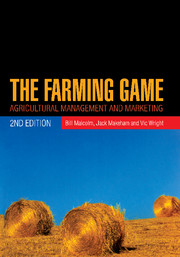Book contents
- Frontmatter
- Contents
- Preface
- Acknowledgments
- List of figures and tables
- 1 Introduction
- 2 The business of farming
- 3 Analysing a farm business
- 4 Analysing innovation in the whole farm business
- 5 Managing risk and uncertainty
- 6 Marketing agricultural products
- 7 Conclusion
- Discounting procedures and tables
- References and further reading
- Glossaries
- Index
- References
6 - Marketing agricultural products
Published online by Cambridge University Press: 05 June 2012
- Frontmatter
- Contents
- Preface
- Acknowledgments
- List of figures and tables
- 1 Introduction
- 2 The business of farming
- 3 Analysing a farm business
- 4 Analysing innovation in the whole farm business
- 5 Managing risk and uncertainty
- 6 Marketing agricultural products
- 7 Conclusion
- Discounting procedures and tables
- References and further reading
- Glossaries
- Index
- References
Summary
Farmers, and other agribusiness firms, naturally need to make decisions that influence the value of their output to their customers. Choices about when and how to sell output are some of these decisions. However, most of the main decisions affecting the value of output are made long before selling occurs. This chapter is about ways of thinking about the links between customer preferences and agribusiness management. Key questions that are considered in this chapter are: ‘What is the role of my firm in the agribusiness system? How should this inform my management decisions? And what changes to the way I relate to other participants in the system might be feasible and profitable?’
As with our earlier chapters, a guiding assumption in this chapter is that meaningful analysis of a situation is fundamental to informed decision making that contributes to the achievement of objectives.
The Agribusiness Firm in Its Marketing Environment
We have so far emphasised the importance of analysis to reliable decision making on farms. Our focus has been on achieving objectives by the adroit employment of resources in an environment characterised by a good deal of uncertainty. In such an environment, managers who fail to define the determinants of performance and the nature of risk, and to respond accordingly, are effectively speculating and leaving the satisfaction of objectives to chance. It is essential to understand the rules of the game, the field on which it is being played and the manoeuvres that are valid.
- Type
- Chapter
- Information
- The Farming GameAgricultural Management and Marketing, pp. 214 - 238Publisher: Cambridge University PressPrint publication year: 2005



